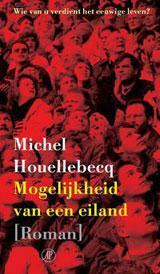Take a photo of a barcode or cover
Got sucked in to reading this by the comparisons to "Oryx and Crake." Unfortunately, I found the protagonist completely inaccessible, which then made the story's bleak picture of the both the nature and future of humanity impossible to digest.
adventurous
funny
mysterious
sad
slow-paced
Plot or Character Driven:
A mix
Graphic: Sexism, Sexual content
very french nihilism tempered by belief in love. throw in cults, clones, mass extinction, and more!
Ljubezen=pes! Odličen prevod, užitek v prozi... Vse pa tako - resnično človeško.
Interesting novel, I like houellebcq’s style but I feel this is not his best
emotional
funny
mysterious
reflective
slow-paced
This novel combines realism and dystopic speculative fiction into a series of philosophical ruminations leading to an existential crisis, not just for the characters but perhaps for the reader as well. It is dark, speckled with humor, light porn, and nihilism. That said, the book is worth a look if one is looking for something that stretches the limits of most 21st-century literary fare. If I read it again, I will read it in French.
Masterpiece describing the experience of being old from the male POV. The last 100 pages were necessary to finish the structure in a tidy fashion, and readable enough, but lacked the brilliance of the first 300 pages.


